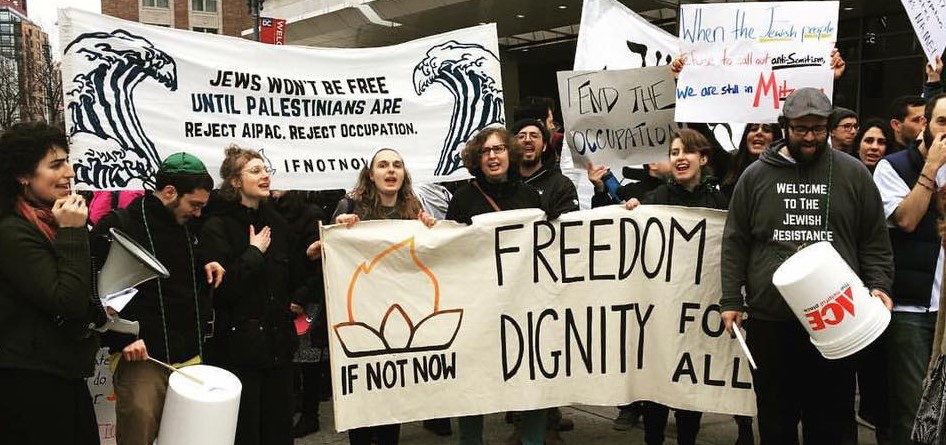
The author was part of this group of young American Jews protesting Israel’s occupation outside an American-Israel Public Affairs Committee (AIPAC) meeting in 2017
The morning after the 2016 presidential election, I woke up wondering if I was still white. I am Ashkenazi (Eastern European) Jewish, and had always felt confident in the safety my light skin afforded me. That day, for the first time, I understood that safety to be conditional. Trump’s victory demonstrated a surging of white supremacy, and with it a definition of whiteness that excluded me.
The past four years have been a terrifying time to be Jewish. Violent racists and neo-Nazis have poured forth as the president tacitly endorses the alt-right. Hate crimes against Jews have risen dramatically, and Nazis have marched openly in the streets. My grandmother called to tell me that she, for the first time since the Holocaust, feared we would find ourselves in camps. We were no longer among the safe.
I have been outraged to see our political leaders respond to this danger not by combatting violent extremism, but by targeting criticism of the state of Israel, particularly on college campuses. This suppression of debate does not make American Jews safer and is no substitute for addressing the very real danger of anti-Semitism. There are many ways to justly critique Israeli policies and politics without veering into anti-Semitism, just as there are many ways to use support of Israel as a smokescreen to hide vile anti-Jewish sentiment. The two are simply separate. Donald Trump, for example, who adopted the anti-Semitic slogan “America First” (harkening back to the 1940–41 America First Committee, which opposed prospective US involvement in World War II), refused to condemn neo-Nazis in Charlottesville, and accused Jews who vote Democratic of “great disloyalty,” deflecting charges of anti-Semitism by pointing to his unconditional support of Israel.
In December, 2019, Trump signed an executive order updating the Department of Education’s working definition of anti-Semitism to include anti-Zionism. We are seeing the impacts of this here in Champaign-Urbana, where “Jewish and pro-Israel” students at the University of Illinois filed a Title VI complaint under the new definition, spurring vigorous debate. The complaint lists 23 incidents of “anti-Semitism and anti-Zionism,” including alarming incidents of anti-Semitic vandalism, but largely focusing on the actions and existence of the student group Students for Justice in Palestine (SJP).
At the crux of this argument is the conflation of Jews and the State of Israel, and of Zionism and Jewishness. Both within and outside of Judaism, there are people who see Zionism (Jewish nationalism) and Jewishness as fundamental to one another. They are not. In fact, the internal debate over Zionism within the Jewish community is as old as Zionist ideas themselves.
Political Zionism arose out of nineteenth-century nationalism, an era in which ethnic groups coalesced around a unified identity and sought land ownership and sovereignty on the grounds of “national identity.” Jews in Europe were an ethnic minority, and found themselves persecuted within the borders of newly forming ethno-states. Zionism offered hope to persecuted Jews with the promise of self-determination in their own land. Oppressed groups worldwide saw nationalism as a path to liberation, and Jews were no exception.
As with other European nationalist movements, however, Zionism overlooked the rights of non-European peoples in its zeal to secure ethnic safety through statehood. The British-controlled territory surrounding Jerusalem provided a haven for Jews fleeing persecution in Europe in the early twentieth century, but in the seizure of control of the territory in the aftermath of British withdrawal in 1948, more than 700,000 Palestinian Arabs, more than half the population, fled or were expelled from their homes, never to be permitted to return. As Europeans, Jews were victims of nationalism in Europe, and as Zionists they reenacted this trauma on Palestinian Arabs in their new land.
The state of Israel is an ethnonationalist political project, one in which unequal rights are granted on the grounds of ethnicity. This is a difficult leap for many Jews, for whom Israel still represents a safe haven from a violent world. At age 18, I visited Israel on Birthright, a partially Israeli government-funded free trip offered to diaspora Jews. Neither my parents nor my grandparents had ever been there, but the first words that I heard from our Israeli tour guide were “welcome home!” It is an ethnonationalist project in which I, under the Right of Return, have the right to claim citizenship in a foreign land—but a Palestinian friend, whose grandparents were expelled from their home at gunpoint in 1948, can be denied the right to even visit. Israel has just under nine million citizens, 20 percent of whom are non-Jewish Arabs, but almost five million more Palestinians live in the Israel-controlled Gaza and West Bank without citizenship rights. They face regular water crises, home demolitions, and settler violence. In the occupied West Bank, Palestinians are controlled by military law, with occupation military courts having a near 100 percent conviction rate, according to the United Nations. Israeli settlers in the same regions are subject to Israeli civil law. In the city of Hebron, Palestinians are required to walk on separate paths from Jews.
Ethnonationalism is fundamentally wrong. It is the driving force behind not only Zionism, but white nationalism. Noted American neo-Nazi Richard Spencer has called himself a “White Zionist,” and sees Israel as the model for his vision of a white homeland in America.
As a Jewish person, I believe it is my responsibility to oppose bigotry and oppression wherever I see it. I am not alone in this: a 2013 Pew Research survey of U.S. Jews found that for the majority of respondents, an ethical life (69 percent) and working for justice and equality (56 percent) are essential to their sense of Jewishness. In contrast, just 43 percent cited caring about or living in the state of Israel as essential.
Jewish groups like Jewish Voice for Peace, IfNotNow, and JStreet evidence a growing population of American Jews who oppose violence against Palestinians, and are dedicated to fighting for a more equal world. For thousands of years, we have celebrated Passover, a holiday of liberation. Each year, when we tell the story of our ancestors’ escape from Mitzrayim, the narrow place, we are invited to imagine ourselves as though we had personally escaped and to commit ourselves to fighting injustice in the world. I hope that soon we can escape a new Mitzrayim, the narrow thinking that requires us to oppress or be oppressed.
Judaism is nearly 4000 years old, Zionism 123 years old, and the state of Israel at 72 is younger than my grandmother. Jewishness can exist, has existed, and will continue to exist beyond Zionism. The conflation of the two demeans deep Jewish diversity and violates our morality as a people. It often masks bigotry against Palestinians as well as Jews.
This is not the way to erase anti-Semitism, and even if it were, I will not have my liberation come at the expense of another.

Jenni Walkup is a public anthropology MA student at American University who lives in Champaign. She works in education and writes about movements and social change. She’s very good at Bananagrams.
